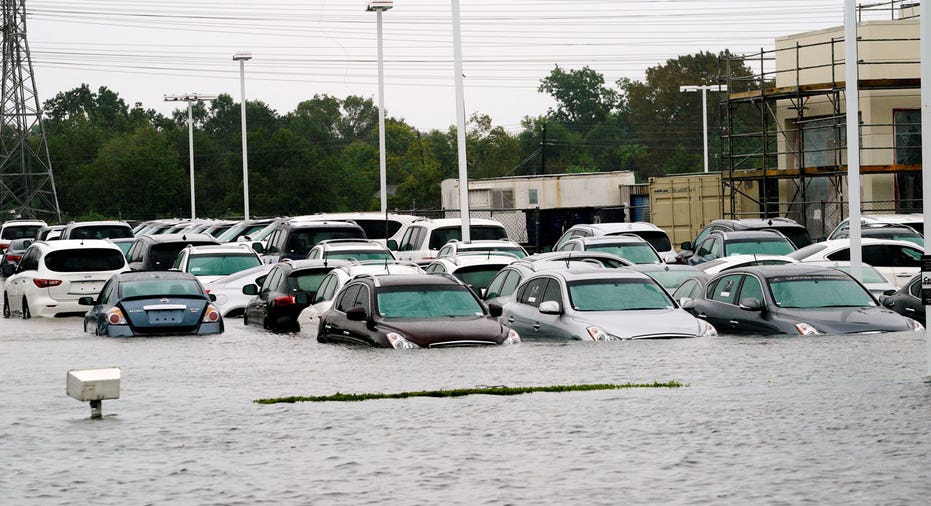Car-centric Houston struggles after loss of countless autos

Bryan Harvey is frequently reminded that he shares a name with the storm that dumped 50 inches of rain on metropolitan Houston and unleashed the floods that have him working 14-hour days towing water-logged cars.
Even in their despair, some victims have salvaged a smile by posing for pictures in front of the "Harvey's Towing" sign on the side of his red Dodge Ram 5500 flat-bed truck.
More than a week after Harvey slammed Houston, wreckers like Bryan Harvey are still hauling cars and trucks from flooded neighborhoods to dealerships or to vast fields where insurance adjusters can assess the damage. Harvey killed at least 70 people, destroyed or damaged 200,000 homes — and inflicted an automotive catastrophe on one of America's most car-dependent cities.
The Houston area has lost hundreds of thousands of cars, says Michael Hartmann, general manager of Don McGill Toyota of Katy, a city of 17,000 about 30 miles west of Houston. "We have a shortage of rental cars and people not sure how to go about handling claims and just what to do with their lives."
The wreckage has forced Houstonians to scramble to try to rent or borrow cars or to work from home — if they can. Some have it worse: They can't return to work until they resolve the transportation problems, depriving many of them of income and slowing the city's return to business as usual.
WHERE CARS ARE EVERYTHING
Few American cities depend on cars as much as Houston. More than 94 percent of the city's households have cars, second only to Dallas, the Cox Automotive consultancy says. Houston is even less amenable to walking, bicycle-riding and mass transit than freeway-mad Los Angeles, according to Walk Score, which promotes walkable communities.
Fourteen-lane highways link downtown Houston to its sprawling suburbs. Off-ramps are stacked five-high at some interchanges, inducing vertigo for motorists unschooled in driving Houston-style. Outside the city center, isolated islands of office towers are connected only by concrete and asphalt.
Cars are "everything here," Hartmann says. "Cars are part of a person's lifestyle. Most people in our area work 25, 30 miles from home."
Houston is used to flooding. But it had never seen anything like Harvey, which dropped a year's worth of rain onto the metro area. Flooded roads and neighborhoods left cars submerged and, in most cases, impossible to salvage.
"Almost every square inch of your vehicle has wires in it," says Rebecca Lindland, executive analyst at Cox Automotive. "The materials are often flame-retardant, but they are not waterproof."
Cox estimates that up to 500,000 cars and trucks were damaged or destroyed, amounting to nearly $5 billion in damage. Auto insurance claims have reached 160,000, according to the Insurance Council of Texas. Cars are being taken by the hundreds to a make-shift lot at the 500-acre Royal Purple Raceway in Baytown, about 35 miles east of town. Most of the time, the insurance adjusters shake their heads at the damage Harvey has wrought and declare the cars a total loss.
"Put yourself in the shoes of the adjuster," says Mark Hanna, a spokesman for the Texas insurance council. "He's just seen, say, a 2015 Toyota Camry. He knows this vehicle has been underwater for six days. They can look at it, but they know water is all throughout that vehicle. They know it is totaled ... He's going to see the same vehicle many times."
Many insurers are reluctant even to try to repair cars that risk further problems and repairs later.
In the meantime, there's a desperate shortage of rental cars. Enterprise Holdings, which includes the Enterprise, National and Alamo brands, has moved thousands of vehicles to southeast Texas and plans to have brought in at least 17,000 by the end of September. The Avis Budget Group, which operates Avis and Budget, is moving 10,000 vehicles into the affected areas, waiving late fees, one-way rental fees and rental extension fees in and around Houston.



















